
The view from my back window in September… I’m just back from a long week in Guadalajara….
While reading and writing history I never stop thinking about radical social change. And I am continually frustrated with my own isolation, which arises from my critical dissatisfaction with what passes for the Left, whether of the social-democratic or the anarchistic varieties not to mention the older hardline M-L versions which I never embraced even when they were riding a bit higher in the late 1970s. Whether through self-imposed ideological leanings, or through a genuine absence of a dynamic political culture where the debates I think are vital are unfolding, I often feel like I’m stuck in a cul-de-sac—either one that is the dominant culture of extreme right-wing insanity, or the smaller one that is the circular firing squad on the Left.
…at exactly the time when it has become clear that global warming is in every sense a collective predicament, humanity finds itself in the thrall of a dominant culture in which the idea of the collective has been exiled from politics, economics, and literature alike.
—Amitav Ghosh, The Great Derangement (University of Chicago: 2016) p. 80

The key to radical social change?…
…gig work is part of the individualizing of economic life and financial responsibility. Every man, woman, and child is implored to take personal control of work, retirement, insurance, education, and so forth. Alas, greater responsibility means greater risk of failure. The Gig Economy is the antithesis of collective responsibility and class solidarity.
—Richard Walker, Pictures of a Gone City: Tech and the Dark Side of Prosperity in the San Francisco Bay Area (PM Press: 2018), p. 116
I’m one of those people who have spent my entire adult life, approximately 40+ years now, thinking and scheming about revolution. During a recent Shaping San Francisco Public Talk we had a decent discussion on the revolutionary upheavals of 1968-70, necessarily a bit brief given the format. Preparing for it I read George Katsiaficas’s book The Global Imagination of 1968, which actually concludes that in terms of the U.S., the year 1970 came much closer to the kind of social break that we might call a revolution. In his book he invokes the concept of the “Eros Effect,” which I believe originated with Herbert Marcuse. This is the name he gives to the powerful feeling of connectedness that emerges in times of social conflict and upheaval.
Trying to come to grips with the despair that is always available these days, and remembering that however awful it is (and it is), we do have collective possibilities that feel dormant but could awaken much faster than we can imagine. Remember how quickly the Arab Spring and its doppelgangers in Spain, the U.S., Turkey, Brazil, Korea, and elsewhere spread, amplifying the eros effect across the planet in a matter of months. The people who took those public squares, who occupied those public spaces, who used the internet to augment the face-to-face networks that are the real foundation of radical change, are mostly still alive and well. The forces of repression have destroyed most of those hopeful manifestations from 2011, but the knowledge of how to do it, the people who did it, and the imaginations that know it’s still possible, are all intact. Better still, the dead-ends encountered last time have been pondered, and presumably new tactics will emerge to overcome obstacles, whether self-inflicted or state-imposed, next time.
Between 1968 and 2011, during my lifetime, both the old and new left fractured and shrank to a meaningless set of grouplets, though the cultural revolt that burst forth during the florescent ’60s and ’70s, prominently among women and the LGBT community, continues to fight for hegemony against the resurgent Right. But formal political organizations and ideologies, Democrats and Republicans, Socialists and Conservatives, have withered and are barely a shell of the public arenas of social conflict they once were.
In other words, the public sphere, where politics is performed, has been largely emptied of content in terms of the exercise of power: as with fiction, it has become a forum for secular testimony, a baring-of-the-soul in the world-as-church. Politics as thus practiced is primarily an exercise in personal expressiveness… [As Guy Debord declared:] “The spectacle is by definition immune from human activity, inaccessible to any projected review or correction. It is the opposite of dialogue. Wherever representation takes on an independent existence, the spectacle reestablishes its rule.”
—Amitav Ghosh, The Great Derangement (University of Chicago: 2016) p. 131
The conservative courts, the spear’s tip of the revanchist Right, may soon invalidate women’s right to access free and legal abortions. Transgender folk are being attacked at all levels, while gay rights may be threatened too before long. Who knows what other anachronistic attacks on women and sexual freedom will follow? Voting rights have already been severely curtailed in the old Confederacy, which seems to think it won the Civil War—few could argue that they haven’t fully consolidated a white supremacist political system during the century and a half after slavery’s abolition. In recent years they have furthered their old agenda of disenfranchising people of color and the poor, reinforcing a bizarre alliance between the corporate elite, bible thumpers, and large parts of the white middle and working class, all of whom readily rally around fear and loathing directed at any near or distant target (Muslims, Mexicans, blacks, women, terrorists, communists…). Dreaming of restoring a long lost mythical American Way of Life, they desperately embrace promises of reversing the clock, of putting things back “as they were” (in their imaginations).

A tax on creativity…
If you are committed to revolution, it’s hard to feel optimistic. The Democrats co-opted the potentially potent but politically unimaginative “Resistance” into their predictable electoral traps. The dynamic street protests of the past couple of years are inspiring, to be sure, whether the Women’s marches or the anti-gun violence protests driven by teenagers, anti-police violence and Black Lives Matter, Standing Rock/Idle No More, or the festive mobilizations around Climate Chaos. But after the massive 2003 protests against attacking Iraq, anti-war/peace efforts fizzled, and street protest as a form seemed less effective than ever. The ability of the minoritarian political elite to ignore protest and continue to loot wealth, engage in war and mayhem, and destroy planetary ecology has not only not slowed, it is still accelerating irrespective of a clear majority that opposes such an agenda. Proposing a revolution against this madness seems equally sensible and impossible. But it depends on how you define “revolution.”
If the idea of revolution in an industrialized society was inconceivable for three decades prior to 1968, the kind of revolution prefigured in the emergent praxis of the movement was unlike previous ones. The goal of revolution was redefined to be decentralization and self-management of power and resources—destruction, not seizure, of militarized nation-states embedded in an international web of war and corporate machinations.
—George Katsiaficas, The Global Imagination of 1968: Revolution and Counterrevolution (PM Press: 2018), p. 9
Unfortunately a great deal of the “self-managed” decentralization that followed was designed and implemented by the capitalist class under the neoliberal “Washington Consensus.” Triumphalist narratives at the end of the Cold War in the early 1990s proclaimed the “end of history” and went into overdrive to discredit the concept of revolution. It wasn’t that hard, given the totalitarian disasters of the 20th century, and the redefinition of self-managed liberation as a series of personal consumer choices. With the personal computer and eventually the Internet, “revolution” became fully banalized as a series of product renovations.
For die-hards of the old or new left (or more recent acolytes) revolution continued to resonate as a dramatic act, a seizing of the Winter Palace or the Bastille, a quasi-religious moment of transcendence in which everything would be completely different the day after. Anything less than a complete transformation of every aspect of life, all at once, everywhere, was readily rejected as mere reformism, or half-way measures, or failure. But this kind of millennarian thinking reveals a poverty of historical and social knowledge. Rebellions, riots, even uprisings at their best might lead to the overthrow of a particular political elite, but rarely have transformed how life is lived. Katsiaficas concludes his book digging deeper into the contrast between rebellion and what we might genuinely call revolution:
A rebellion… merely demonstrates discontent with the present state of affairs. When people revolt, they rise up against those perceived to cause a common problem, not to create a new reality. A revolt culminates in negation of existing rulers, values, and institutions, not in the affirmation of new modes of life. As Sartre put it: “The revolutionary wants to change the world; he transcends it and moves toward the future, toward an order of values which he himself invents. The rebel is careful to preserve the abuses from which he suffers so that he can go on rebelling against them . . . He does not want to destroy or transcend the existing order; he simply wants to rise against it.”
—George Katsiaficas, The Global Imagination of 1968: Revolution and Counterrevolution (PM Press: 2018), p. 304
Where then can we find revolutionary possibilities? I agree that changing how we live is unlikely to emerge in the spectacular moments of revolt and resistance that punctuate history. I think revolution of the type we’re groping for is something going on all the time, everyday, where the seeds of a new life are germinating in daily practices of solidarity and mutual aid, caring for each other and the natural world. The logic of these daily practices, so common and yet so voiceless politically, repudiates the logic of markets, commmodities, and the reduction of all to the measurement of money. Radical change towards a more egalitarian, horizontal, ecologically sane future is not only possible, but is fervently percolating beneath the surface.
It is largely invisible unless you are directly engaged in it, since it is systematically ignored by mass media, and politicians and business leaders alike have a vested interest in channeling any social energies towards their own self-interested purposes. The recently announced “Green New Deal” represents an attempt by newly elected Democrats to co-opt this subterranean energy and re-integrate it into the self-evidently moribund political system. To be sure, we have a lot of work to do to halt carbon emissions and reorient the everyday production of our lives to systems that harmonize with underlying ecological imperatives. And if we can push a federal funding source that might emerge from a problematic Green New Deal to paying for things that expand our capacity to direct our own lives, to make the deep changes we must make, or at least to facilitate an expansion of those possibilities, that’s worth fighting for.
This is where Massimo de Angelis’s recent book Omnia Sunt Communia: On the Commons and the Transformation to Postcapitalism tries to offer a new way of thinking about revolutionary politics. He is an old friend, and long-time collaborator with my pals at Midnight Notes, too. He tries to reconcile some of the autonomist Marxist ideas we’ve all been batting around for the past decades with the work of Elinor Ostrom on the Commons, for which she won a Nobel Prize in Economics. His book is long on the nuts and bolts of commons, taking pains to define what is and what isn’t properly understood as commons—emphasizing that commons have many dimensions but that without commoners who produce and protect commons, there is nothing.
When carried out in the commons, a division of labor does not need to be the instrument of alienation and exploitation and hierarchy of conditions of labor; it can instead be an instrument to work less. (p. 211) The freedom that the commons gives you is a freedom you will find nowhere else: that is, the freedom to shape, together with others, the condition of your doing, of your caring, of your commoning. Freedom as auto-determination, to determine autonomously. And, since to determine is to select from the complex realm of the possible, to determine is to set limits, thus to set limits autonomously. (p. 204)
He’s willing to roll up his sleeves and propose a way of thinking about making deals short of the all-at-once total transformation that so many revolutionaries get hung up on: “The strategic horizon therefore is not to avoid making deals, but how to make a given deal that basis upon which commons can develop new forms and try to outflank capital by including the issues and the people who have been excluded by it.” (p. 274) I found a lot of the book rather dry, though if you’re interested in comparisons of the basic Marxist description of the simple commodity cycle versus the Money-Commodity-Money cycle of capitalism and how that relates to the commons, this is a great book for it. He does pepper the book with a number of useful examples, many taken from the Andes (including Salinas de Guaranda, a cooperativized town in Ecuador where Adriana and I visited some years ago) where he spent time visiting communities who still use the traditional “minga” (the best translation in English is “barn-raising,” i.e. freely shared community work) to produce and enhance common goods that underly their lives. But Massimo is a great revolutionary thinker and here I’ll let him speak for himself in extended quotes on social revolution that address directly the thoughts I’ve been rolling around here:
…social revolution cannot be reduced to a momentary event, a ‘victory,’ but instead it is epochal and configured by a series of ‘victories’ and ‘defeats.’ Marx thus speaks of the ‘beginning’ of the ‘epoch of social revolution’. How long this epoch is, none can say (although climate change and the massive crisis of social reproduction are putting some constraints and urgencies on the horizons.) … Systems are not implemented, their dominance emerges; and their emergence occurs through the related processes of social revolution and political revolutions, with the former creating the source from which the latter get their power to perturb capital while at the same time developing their autonomy… The process of social revolution is ultimately a process of finding solutions to the problems that capital systems cannot solve, because it has created them, and the rest of us have an urgent need to address them: social justice, a dignified life for all, climate change, environmental disaster… What has become increasingly clear from the various movements in the recent decades, from the Zapatistas in the mid-1990s to the Occupy movement in 2011, is that whatever the alternative put forward by an idiosyncratic section of the movement—whether micro or macro, whether participatory budgets, reconfiguration of social spending by the central state, transition towns, renewable energy cooperatives, self-managed factories, non-criminalized cyber-activism, defense of traditional communities along a riverbed threatened by enclosures, general assemblies, self-managed public squares and so on—they all depended on some form of commons, that is social systems at different scales of action within which resources are shared, and in which a community defines the terms of the sharing, often through forms of horizontal social relations founded on participatory and inclusive democracy.
I italicized the point above about systems not being implemented because I think that is another key flaw in many “revolutionary programs.” There will never be a fully developed new way of life that is thought up before the necessary social transformations are already underway. It is precisely during those self-directed transformations, led by an unknowable number of people using new forms of direct democracy that haven’t yet been adopted that the new ways of life (what is implied by a “program”) will emerge. And it will certainly not be a smooth process. Setbacks and defeats are sure to be part of the birthing process. But if the changes are deeply enough rooted in actual practical behaviors that have been developing for a while, that provide a foundation for radical alternatives to the political and economic structures that govern life, then the revolution may not be inevitable, but it will be hard to resist!

Lucia Ippolito and friends painting a new mural in Balmy Alley dedicated to radical women.

And the mural finished!
In the meantime, before the global political and economic systems give way to a new world system based on an egalitarian and dignified shared life for all, there will be some years of interaction between the world we are trying to birth, and the world that stands in our way. Massimo has some thoughts on this process as well:
…in the development of these alternatives one has to deal with several aspects of existing states and markets and the circuits they reproduce: we need them to various extents, and fight against them on other occasions. Hence it is necessary to develop a relational stance towards them, a relational stance which is not just to ‘say no,’ but also to engage in constituent practices that try to change them to favor the development of commons, that structurally couple to them but from a position of power and, certainly, while never giving up the autonomy of the commons. (p. 312) …
We are all impatient. The daily insult of living in the U.S. under the Grifter-in-Chief while he leads the greatest kleptocratic looting of common wealth in history is impossible to overstate. His constant lying, bragging, carping, and threatening drowns out so much else—by design. The deep continuity between this regime and the previous ones is even harder for many to see. The ongoing Long War in the Middle East and North Africa with ever expanding military spending, and ever expanding “security” bureaucracies and mass surveillance are entrenched ruling class policy across parties and ideologies. Vast untouchable subsidies for oil and cars are another obvious feature of this continuity. Protection of offshore tax havens and systematic unregulated financialization, allowing the 1% to dodge taxes while running a vast pyramid scheme of derivatives and debt, also characterizes the past two decades of ruling class policy, regardless of who is president.
But revolution takes its own time. As Massimo noted, climate change and ecological collapse are shortening the time available to make the changes we urgently need, but no one can make it happen any faster than it is. Every act of kindness, of mutual aid, of unremunerated but useful activity, and every defense of nature is a part of the deeper revolution that is coming. Radical patience is both necessary and frustrating. We can see what is happening and we want to change course. But the cul-de-sac closes in, and it seems there’s no way out. But I think we may surprise ourselves and find an exit from this dead-end world, perhaps in plain view. Let’s hope so!
“Money flows toward short term gain,” writes the geologist David Archer, “and towards the over-exploitation of unregulated common resources. These tendencies are like the invisible hand of fate, guiding the hero in a Greek tragedy toward his inevitable doom.” This is indeed the essence of humanity’s present derangement.
—Amitav Ghosh, The Great Derangement (University of Chicago: 2016) p. 111
Commons movements are movements that have the recomposition of the commons as their driving force, and this recomposition is founded on the commons of reproduction: food, care, energy, housing, and education.
—Massimo de Angelis, Omnia Sunt Communia: On the Commons and the Transformation to Postcapitalism (Zed Books, London: 2017), p.386
[There is] an emerging post-capitalist alternative which simultaneously transforms civil society, the market and the state forms. Civil society becomes productive, since citizens and inhabitants are commoners contributing to shared resources. The market forms become non- or post-capitalist, transformed to be compatible with the logic of the commons. The accumulation of capital is transformed into the accumulation of the commons. Public authorities become enablers of the personal and social autonomy necessary to be able to contribute to the commons.
“Re-imagining the left through an ecology of the commons: towards a post-capitalist commons transition”
by Michel Bauwens & Jose Ramos in Global Discourse July 12, 2018

A gorgeous permaculture garden on Potrero Hill, thriving after several years of cultivation.

Great poster by Fernando Marti.

The Pacific ocean looking north from Ocean Beach across the mouth of the Golden Gate… How long will this beach be here?


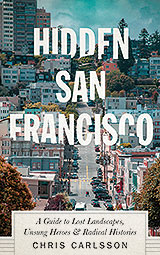
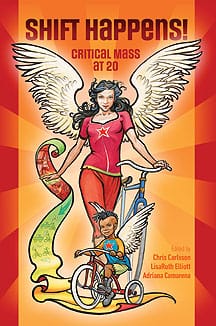
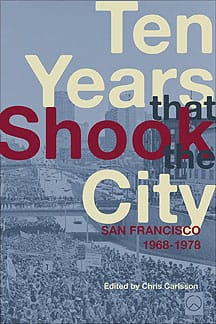


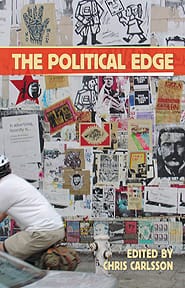
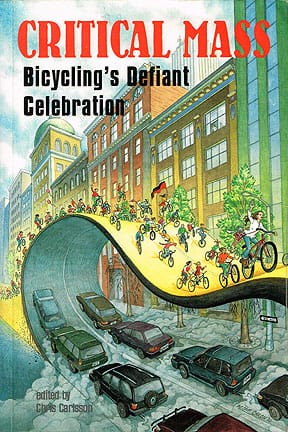

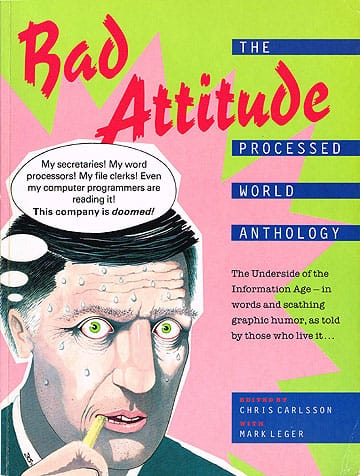

Classic Carlsson! But how bout a few current examples of this kind of commoning? I kept thinking, which of these relationships will endure and inspire during a rapidly degenerating crisis and which will be swept away? Because we live in a society, one that surrounds and penetrates whatever community we may also be a part of. And though I’m also not a fan of “programs” to be implemented, I think rapid responses to certain rapidly developing eventualities will be (are already) necessary. To me this is one important aspect of a revolutionary orientation: readiness.